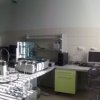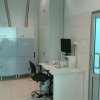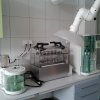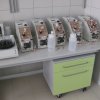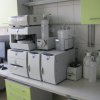The Laboratory of Water and Sewage Analyses is a part of the Department of Environment Engineering in the Central Mining Institute existing for more than 65 years. Long-term experience in environment state research, qualified staff, modern analytical equipment of renowned production companies, the application of the Good Laboratory Practice (GLP) and modern research background enabled the implementation in 1997 of a management system meeting the requirements of existing standards and documents (currently PN-EN ISO/IEC 17025: 2005 standards).
The credibility of the research and technical competence of the Laboratory
have been confirmed by laboratory accreditation certificate No. AB 145
The Laboratory operates within the structure of the Central Mining Institute, where the Integrated Management System is implemented in accordance with the requirements of standards PN-ISO 9001, PN-N-18001 and PN-EN ISO 14001.
The Laboratory of Water and Sewage Analyses carries out research works concerning the development of new test procedures used in analyses of natural and outflow waters of high content of dissolved substances. Laboratory staff are involved in the work of the Polish Normalisation Committee in Inorganic Chemistry Section for Quality Of Water.
The Laboratory performs, as service works, over 3000 physical-chemical analyses of water and sewage a year meeting the requirements of customers from the mining, energy, construction, road construction, food, pharmaceutical industries, environmental protection services and others. More than 100 of the physical-chemical parameters in tested samples are determined using a variety of measurement techniques, including the very modern ones, ex. plasma emission spectrometry (metals and non-metals), high-temperature decomposition technique (OWO, Nog. AOX), ion chromatography (inorganic anions), flow techniques with spectrophotometric detection (cyanides, phenols, surfactants, ammonium ions).
The subjects of tests in the Laboratory are:
- water intended for human consumption,
- natural mineral and spring as well as table waters,
- medicinal and thermal waters,
- surface waters,
- underground waters (with a particular focus on mine waters, including brines),
- leaching water from waste dumps located in closed mining workings or in surface waste dumps,
- industrial and technological waters,
- industrial sewage,
- socio-domestic and municipal sewage,
- salts,
- some foodstuffs.
The Laboratory tests the following waters and sewage:
A) accredited by the Polish Centre for Accreditation
- organically bonded halogens suitable for adsorption (AOX),
- ammonium ions,
- nitrates,
- ammoniacal, nitrate and nitrite nitrogen,
- total, Kjeldahl and organic nitrogen,
- nitrites,
- colours,
- biochemical oxygen demand (BODn)
- bromates, chlorates and chlorites
- bromides,
- chemical oxygen demand with bi-chromate and permanganate method (ChZTCr and ChZTMn)
- chlorides,
- chromium (VI),
- free, total and bonded cyanides
- ether extract (substances extracting with petroleum ether)
- fluorides,
- phosphates,
- phenol index (volatile phenols),
- permanganate index,
- iodides,
- magnesium,
- turbidity,
- pH reaction,
- total organic carbon (TOC)
- proper conductivity,
- sulphates,
- sulphides,
- anionic surfactants (anionic detergents),
- non-ionic surfactants (non-ionic detergents),
- non-volatile and volatile dissolved mineral substances,
- dry, non-volatile and volatile, mineral residues,
- dissolved oxygen,
- total hardness,
- calcium,
- carbonates, bicarbonates and hydroxides
- mineral and total alkalinity,
- total suspensions,
and also:
- sodium, potassium, iron, manganese, cadmium, cobalt, copper, chromium, nickel, lead, zinc, silver, aluminium, arsenic, boron, barium, beryllium, bismuth, mercury, lanthanum, lithium, molybdenum, phosphorus, sulphur, antimony, selenium, silicon, tin, tellurium, strontium, thallium, titanium, vanadium, zirconium;
B) tests not covered by the PCA accreditation:
- free and total chlorine,
- aggressive carbon dioxide,
- free carbon dioxide,
- phosphates,
- density,
- silicates,
- acidity,
- volatile fatty acids,
- redox potential,
- rhodanates,
- soluble organic compounds,
- sulphites,
- thermal stability,
- carbonate and non-carbonate hardness,
- putrescibility,
- scent,
- suspensions prone to falling,
- iron (II).



